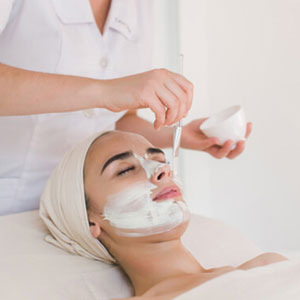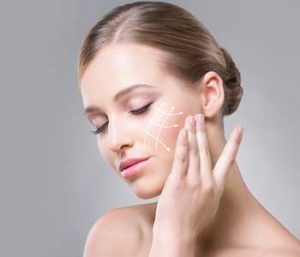Skin conditions such as acne scarring can cause self-consciousness and frustration. Luckily, chemical peels are a great way to rejuvenate the skin with minimal downtown and disruption to daily life. At Dermatology & Cosmetic Laser Center in Huntington, NY, we have seen great success using chemical peels to address skin conditions such as acne scarring.

If you live in the Huntington, NY area, and would like to find out if chemical peels can help your acne scars or other problems, please call Dermatology & Cosmetic Laser Center today at (631) 417-3300 to learn more.
What are chemical peels?
Chemical peels are used to gently exfoliate the skin using different acids of varying strengths. The exfoliation promotes fresh new skin cells, which soften the skin and minimize a wide range of skin concerns. Chemical peels are actually one of the oldest skincare treatments still in use today, and have been well loved by many people for decades due to their versatility in correcting skin flaws.
Conditions treated with chemical peels
The following conditions respond well to chemical peels:
- Fine lines and wrinkles
- Age spots
- Acne scars
- Sun damage
- Hyperpigmentation
- Large pores
- Rough skin texture
Types of Chemical Peels
Chemical peels are categorized based on the strength of the acids as well as the different combinations used together. The strength of the chemical peel and how deeply it penetrates depends on the condition being treated. Deeper peels cause more side effects and require more recovery time than light peels, but typically produce more dramatic results.
Three of the most common peels include: glycolic acid, salicylic acid, and trichloroacetic acid. Read on to learn more about each one.
Glycolic Acid Peels
Glycolic acid is a light, safe peel that is designed specifically to target the outermost layer of skin. This superficial peel is effective at treating the dark patches associated with melasma and certain types of acne.
Glycolic acid peels have almost no recovery period. Patients will notice that the skin appears pink following the treatment and may feel drier for a few days.
We Are always available to help you.... Call Us Today
New Patients: (631) 417-3300 | Existing Patients: (631) 421-4398 Book an AppointmentSalicylic Acid Peels
While still considered to be a superficial peel, salicylic acid does penetrate deeper into the skin and provides great results for improving skin tone and texture. There is still little downtime after salicylic acid peels, but patients will notice that skin feels tighter along with mild peeling for several days after treatment. Salicylic acid peels are excellent for patients who suffer from acne as a result of oily skin.
Trichloroacetic Acid Peels
These medium-depth peels penetrate deeper into the skin, actually eliminating part of the dermis. This type of peel is used for correction of sun damage, pigmentation irregularities, actinic keratosis, acne scarring, and fine lines and wrinkles. Following a trichloroacetic peel, the skin will appear red and tight. Recovery will include skin peeling that can last up to 10 days.
Chemical Peels and Acne Scarring
How do acne scars form?
 Acne scars are a result of a deep trauma to the skin that is caused by acne breakouts. The scars can be pitted areas or raised skin, and can be located anywhere on the body where there was an acne lesion.
Acne scars are a result of a deep trauma to the skin that is caused by acne breakouts. The scars can be pitted areas or raised skin, and can be located anywhere on the body where there was an acne lesion.
When skin pores become clogged with excess oil and dead skin cells, acne lesions such as blackheads, whiteheads, papules, or cysts may form. If these lesions rupture, it causes trauma to the skin. The acne scarring forms during the body’s natural process to heal the area and form new collagen fibers. External factors such as picking at or popping acne lesions can exacerbate scarring.
What chemical peels are best for acne scars?
Chemical peels are a great solution for acne breakouts and scarring because the results are long lasting, reducing the long-term effects of acne scarring. Choosing which peel is best for acne scarring depends on many factors including skin type and color, the severity of the scarring, and the size of the treatment area.
During a consultation, the team at Dermatology & Cosmetic Laser Center can examine the acne scarring to determine which chemical peel to recommend. In general, medium to deep chemical peels are most effective for acne scarring. These types of treatments are done in the office by a dermatologist, and they require downtime and recovery.
Acne scarring can be traumatic, but it doesn’t have to be forever. If you live in Huntington, NY, call Dermatology & Cosmetic Laser Center today at (631) 417-3300 to schedule an evaluation for chemical peels.









